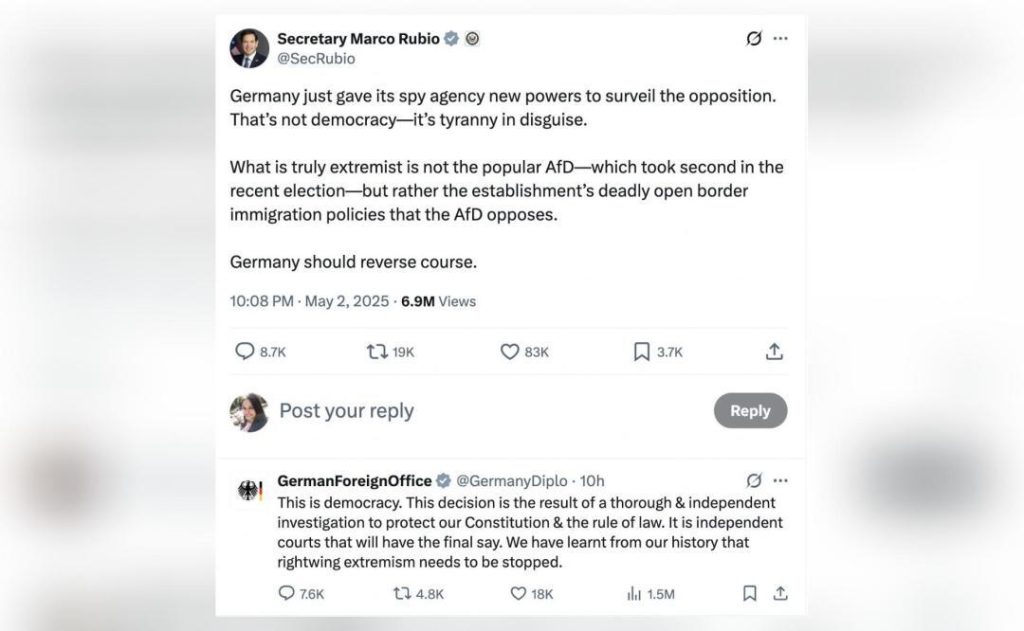
US’ Rubio & German Govt Clash over AfD Party’s ‘Extremist’ Tag
In a recent diplomatic spat, US Secretary of State Marco Rubio and Germany’s Foreign Ministry clashed over the German government’s decision to term the far-right Alternative for Germany (AfD) party as “extremist”. The controversy has sparked heated debate and raised concerns about the delicate balance between national security and political freedom.
The rift began when Germany’s domestic intelligence agency, the Federal Office for the Protection of the Constitution (BfV), classified the AfD party as “extremist” due to its alleged ties to neo-Nazi groups and anti-Semitic rhetoric. The decision was made after a thorough investigation to protect the German Constitution, according to the German government.
However, US Secretary of State Marco Rubio took umbrage with the decision, accusing Germany of enabling “tyranny in disguise”. Rubio’s remarks sparked a strong reaction from the German government, which defended its decision as a necessary measure to safeguard the country’s democratic values and national security.
The controversy has sparked a lively debate about the role of intelligence agencies in monitoring political parties and the balance between national security and political freedom. While some argue that the AfD party’s ideology and actions warrant scrutiny, others contend that the government’s decision is an overreach and a threat to political freedom.
The AfD party, founded in 2013, has been a prominent force in German politics, winning nearly 13% of the vote in the 2017 federal election. Despite its relatively moderate platform, the party has been criticized for its alleged ties to extremist groups and its anti-immigrant and anti-refugee rhetoric.
The German government’s decision to term the AfD party as “extremist” is not without precedent. In 2018, the BfV classified the AfD party as “right-wing extremist” due to its alleged connections to neo-Nazi groups and its anti-Semitic rhetoric. The decision was met with criticism from some AfD leaders, who accused the government of political repression and censorship.
The current controversy has sparked a heated debate about the role of intelligence agencies in monitoring political parties and the balance between national security and political freedom. Some argue that the government’s decision is a necessary measure to protect the country’s democratic values and national security, while others contend that it is an overreach and a threat to political freedom.
In a statement, a spokesperson for the German Foreign Ministry said, “The decision regarding the AfD is a result of thorough investigation to protect our Constitution. We will continue to monitor the party’s activities and take necessary measures to ensure the security and stability of our country.”
Rubio’s remarks, however, were met with criticism from some German politicians, who accused him of meddling in Germany’s internal affairs. “We will not be lectured by anyone on how to protect our democracy and our Constitution,” said a spokesperson for the German government.
The controversy has also sparked a debate about the role of US Secretary of State Marco Rubio in the matter. As a prominent figure in international diplomacy, Rubio’s remarks have been seen as a significant intervention in Germany’s internal affairs.
In conclusion, the clash between US Secretary of State Marco Rubio and Germany’s Foreign Ministry over the AfD party’s “extremist” designation has sparked a lively debate about the role of intelligence agencies in monitoring political parties and the balance between national security and political freedom. While the German government has defended its decision as a necessary measure to protect the country’s democratic values and national security, some argue that it is an overreach and a threat to political freedom.



